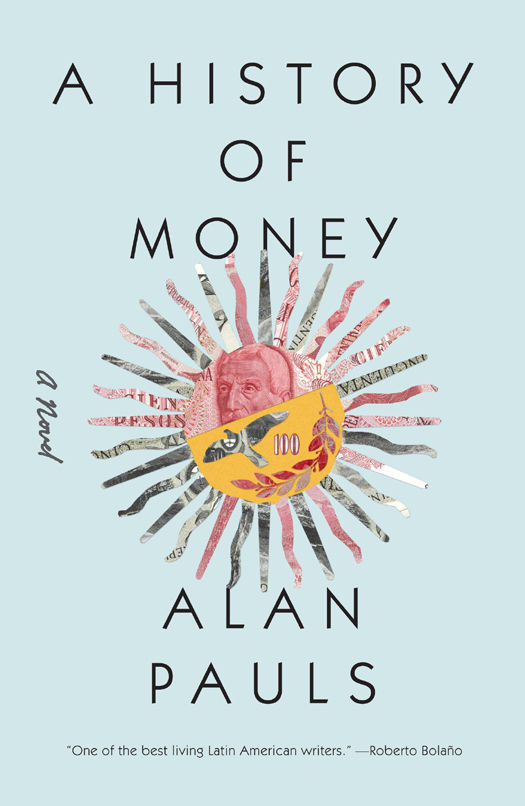
A History of Money
A Novel
کتاب های مرتبط
- اطلاعات
- نقد و بررسی
- دیدگاه کاربران
نقد و بررسی

Starred review from March 23, 2015
The first book published in the U.S. from acclaimed Argentine author Pauls is a stream-of-consciousness novel chronicling a family’s tumultuous relationship with money. The nameless narrator’s mother has left his father and remarried a wealthier man. As the story begins, an executive with a mining company, who is a friend of the narrator’s stepfather, has been sent to deliver a briefcase full of money to a group of striking workers. A bribe? A concession to demands? Payoff for strikebreakers? We never know: the helicopter carrying him crashes, and, though the body is found, the briefcase goes missing. The narrator spends pages evoking the irritating sound the family friend made while chewing crostini, the awful crunching serving as metaphor for a generation’s conspicuous consumption. Such bravura sequences largely take the place of plot—the narrator jumps between reminiscences of his father, reflections on his own life, and stories of his troubled relationship with his mother, darting around time and space, connected by feelings and details but seldom by events. Meanwhile, the economy booms
and busts, alternately compounding the family’s calamities and enabling their upswings. Pauls tells the story of this dark and politically troubled period in Argentine history almost entirely through an economic prism, suggesting that materialism is the mother of complicity. This caustic indictment, and the stylistic tour de force through which it’s delivered, should help secure English speakers’ awareness of Pauls as an important writer.

April 1, 2015
A man recalls his past through the filter of money-often ill-gotten or badly spent-in this inventive if tangled tale. The protagonist of this second translated novel by Argentine writer Pauls (The Past, 2003) opens his story at age 14, when he witnessed the funeral of a captain of industry who died in a helicopter crash under mysterious circumstances. The man was a family friend, but the narrator here and elsewhere isn't interested so much in intimacies and relationships as financial connections: as he drills deeper into his past, he ponders the dead man's attache case full of cash, his father's lifelong gambling habit, his mother's ineptitude with money, and his own bad investment in a money pit. "Ponder" is the operative term here: Pauls writes in a recursive style built on long sentences with subclauses that aspire to Jamesian girth and gravitas. Credit Pauls for a rhetorical command that keeps these sentences from collapsing (and translator Robins for successfully preserving their integrity). At its best, the strategy conveys the gnarled and interior mental state that such financial fixation produces (in the early sections, the protagonist obsesses over the dead man's irritating crostini-crunching); at its worst, and too often, it's simply digressive, overexpanded navel-gazing. That's all the more frustrating because buried under Pauls' thickets of prose is a pointed commentary on the fragility of money and the oppressive Argentine politics of the 1960s and '70s. And Pauls can sensitively render the way money both bound and disconnected the novel's hero from his divorced parents. But when it comes time to bring the story to a strong emotional finish, the impact of the climax is overwhelmed by the sheer weight of the prose; though short as a novella, it's dense as an epic but without the widescreen effects. A well-intentioned experiment that's hobbled by its longueurs.

June 1, 2015
At the opening of this intensively written novel by a highly regarded Argentine writer making his American debut, a nameless 14-year-old sees his first dead person--a family friend and captain of industry who had a briefcase full of cash chained to his wrist when his helicopter exploded before delivering him to a meeting with striking workers. Later, we meet the narrator as an older, divorced man who "always seems to have his money within arm's reach." In between, the narrator tells his life story through his (and his country's) obsession with cash. Call it crass, but this is Argentina mostly in the 1970s and 1980s, when the Dirty War and hyperinflation sometimes rendered human life and money pretty worthless. VERDICT Distinctive storytelling.
Copyright 2015 Library Journal, LLC Used with permission.

May 15, 2015
This quick, dynamic novel, the third installment in Buenos Aires author Pauls' History trilogy, follows an unnamed narrator from his teenage years in the 1960s into the late 1980s, decades that coincide with the worst of Argentina's wildly fluctuating exchange rates. The result is an eloquent, cycling chimera of economy, currency, and family strained by overburdened purse strings. The book opens at the funeral of a business executive whose helicopter crashed into a river, taking with it a suspicious briefcase packed with cash. The mysterious circumstances of the chopper's disappearance linger, as Pauls unravels the complicated relationships the narrator shares with his divorced parents. From his father's gambling addiction to his mother's frequent pleading for cash to the narrator's own sinkhole investment in a vacation home that earns the nickname The Pit for obvious reasons, Pauls dazzles the reader with run-on sentences and page-long paragraphs that generate a linguistically rich, money-hungry momentum. Although the mid-aughts recession appears to have passed, the frantic urgency of Pauls' fictional take on a nation in flux will resonate for years to come.(Reprinted with permission of Booklist, copyright 2015, American Library Association.)

























دیدگاه کاربران